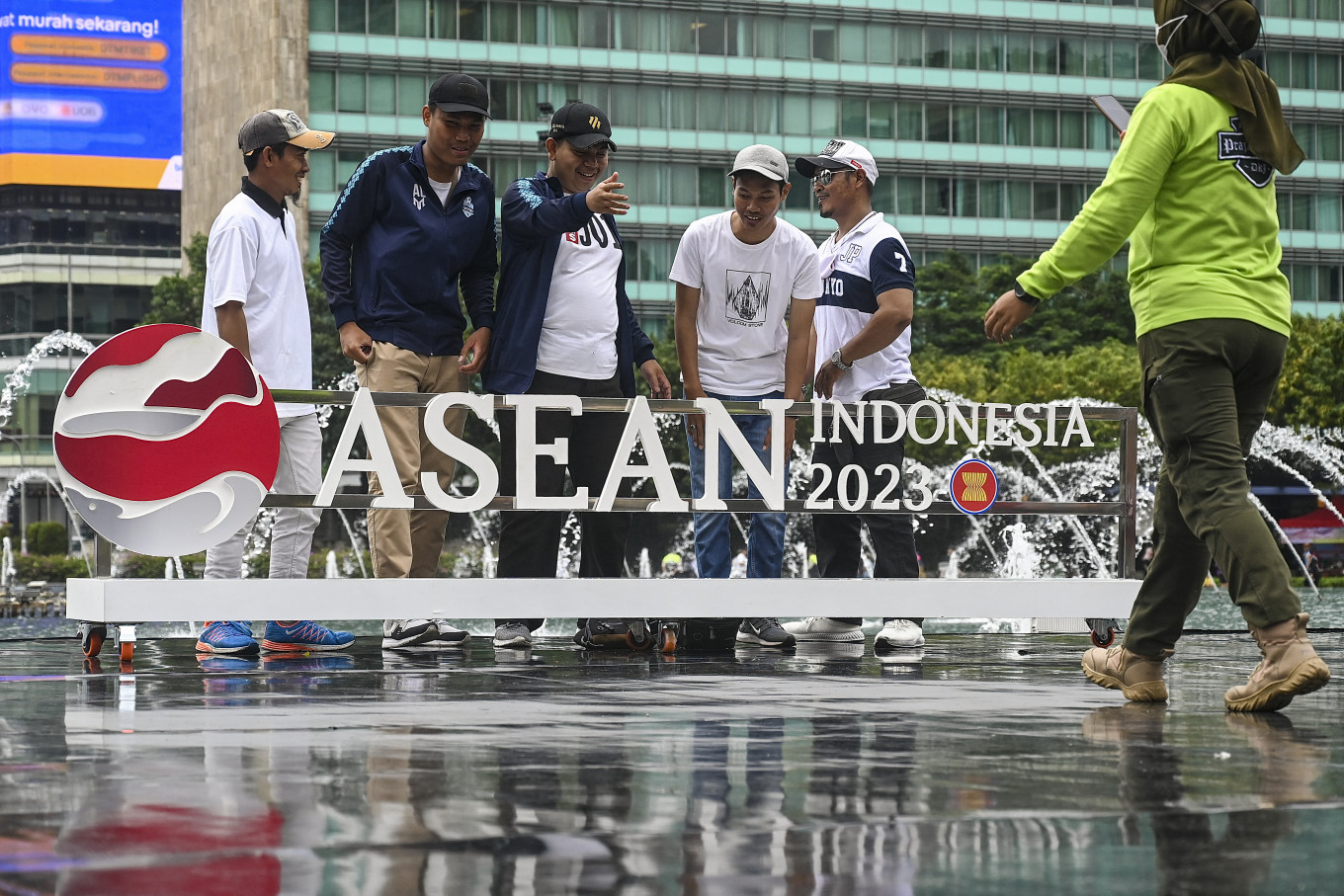Popular Reads
Top Results
Can't find what you're looking for?
View all search resultsPopular Reads
Top Results
Can't find what you're looking for?
View all search resultsEnvisioning ASEAN’s comprehensive response to regional dynamics
Foreign direct investment from the US to economies outside Asia has increased by 21.6 percent while FDI to China and other Asian countries has dropped quite significantly.
Change text size
Gift Premium Articles
to Anyone
O
ne important lesson learned during Indonesia’s Group of 20 presidency last year was that economic cooperation cannot be separated from the security and political contexts. While Indonesia attempted to keep the G20’s attention fixed on economic issues, it became increasingly evident that geopolitical issues were too intertwined with economics to be ignored.
As Indonesia chairs ASEAN, the country should take a more active role in encouraging the regional bloc to appropriately respond to geopolitical dynamics, particularly the escalating rivalry between major powers.
These rivalries have brought significant implications to the global and regional economies. Through the lens of political and security considerations, economic interdependencies are increasingly viewed as a source of potential vulnerability that could lead to the fragmentation of the world economy.
The effect of this division would be quite significant. The IMF estimated that developing countries are disproportionately affected, with losses of about 3.3 percent of their gross domestic product (GDP) in the more severe decoupling scenario. Another estimation suggests the global GDP will shrink by US$52.8 trillion in the coming decade under a worst-case scenario of full decoupling.
At first glance, it seems that economies in Southeast Asia stand to benefit from the relocation of investment from China. Indeed, the foreign direct investment (FDI) inflows in ASEAN recorded an increase of 42 percent in 2021 to $174 billion. However, the trend might have shifted as more companies seek to diversify from China by reducing their exposure to policy risks and trade tensions.
A comparison of greenfield investment data in 2015 and 2022 found that FDI had already started to move away from China and ASEAN countries. FDI from the United States to economies outside Asia has increased by 21.6 percent while FDI to China and other Asian countries has dropped quite significantly. FDI is becoming more sensitive to geopolitical tension.
The ongoing technological war will also affect the regional economy due to reduced knowledge diffusion and dampened innovation which could lead to lower productivity. Most importantly, it is harmful to the region’s technology supply chain. For example, when the US implemented export controls on Huawei in 2020, it was estimated to cause a 3.3 percent decrease in Japanese exports compared with 2019.
In addition, the major power rivalries have created a complex dilemma for ASEAN countries. The bloc has traditionally avoided conflict and close ties to any country by using a hedging or double binding strategy. ASEAN has achieved success in bringing peace and prosperity to the region and has won a reputation as a bridge between great powers and an institutional buffer in geopolitical tension.
However, the return of great power rivalries, competing initiatives and economic cooperation platforms has made it difficult for ASEAN to maintain its relevance and centrality in the regional architecture. It could even create a schism within ASEAN, as member countries may align differently based on their economic interests and security considerations.
How should ASEAN respond?
The current development requires ASEAN to have a comprehensive approach that integrates economic, military, environmental and humanitarian elements as integral components of national and regional security. Rather than separating military and non-military security into disparate domains, this integrated approach must recognize economic, existential and humanitarian considerations as equal elements of regional security frameworks.
The frameworks should address the challenges to resilience in the Indo-Pacific arising from the potential of open conflict and the emergent existential threats posed by climate change, pandemics and resource depletion. It should also become the basis of ASEAN’s engagement with its partners in the region, including the US and China.
An essential step in this direction is to explicitly recognize the intertwined economic and security domains, particularly given their converging trajectories in the current uncertain global landscape. ASEAN has been very successful in pursuing economic integration within the region and with its partners. It is time for the association to be more active in creating the political and security agendas for the region.
Indonesian chairmanship should bring the geopolitical context into the leaders' discussion and call for a comprehensive framework based on the elements of peace, prosperity and resilience. No element should dominate or be considered a substitute. Indonesia could propose a leader’s statement for all countries to take concrete actions to promote perpetual peace in the region, including between its partners.
Several underutilized ASEAN-led platforms can be used to amplify this message and make the comprehensive framework operational. The East Asia Summit (EAS), which brings together leaders from East Asian and Pacific countries, can be a good starting point. The proposed framework could become one of the deliverables at the future EAS Summit.
In the economic area, the Regional Comprehensive Economic Partnership (RCEP) should promote the comprehensive concept of economic security and resilience, which sees inclusive economic integration and interdependence as sources of prosperity rather than weakness. RCEP members should also actively prevent the “weaponization” of economic and trade policies for short-sighted security purposes.
Despite its modest size, the group is the only organization with the potential capacity to actively shape outcomes in the region and beyond. In the face of escalating geopolitical and economic challenges, it is imperative that ASEAN adopt an even more proactive stance. This is not only about maintaining its role and centrality; it is a call to safeguard the region's existing stability, peace, prosperity and resilience. As this year’s chair, Indonesia has a responsibility to initiate the discussion for more concrete actions in the future.
***
The writer is executive director of Centre for Strategic and International Studies, Jakarta.










